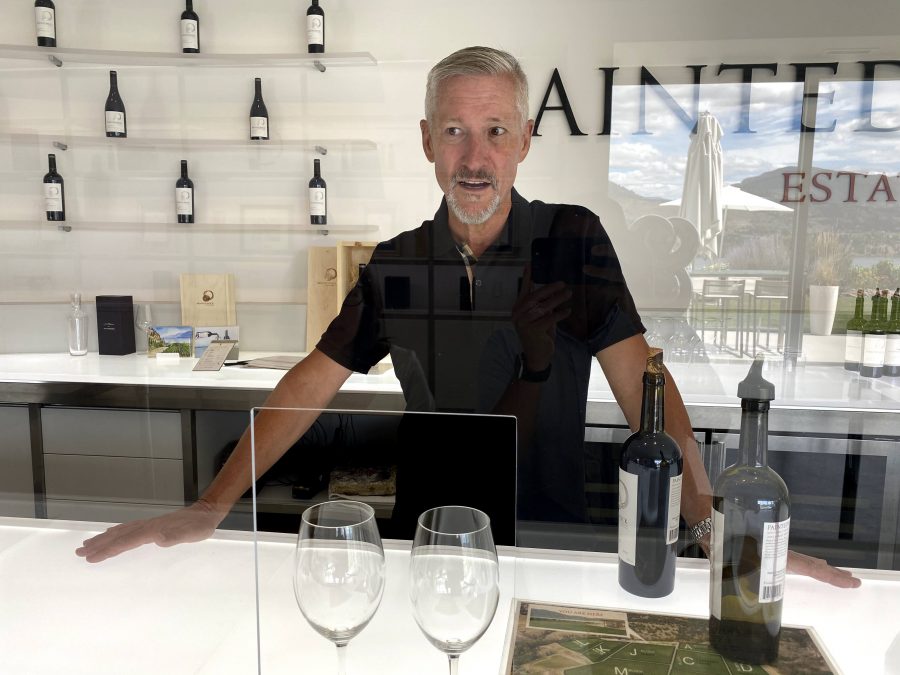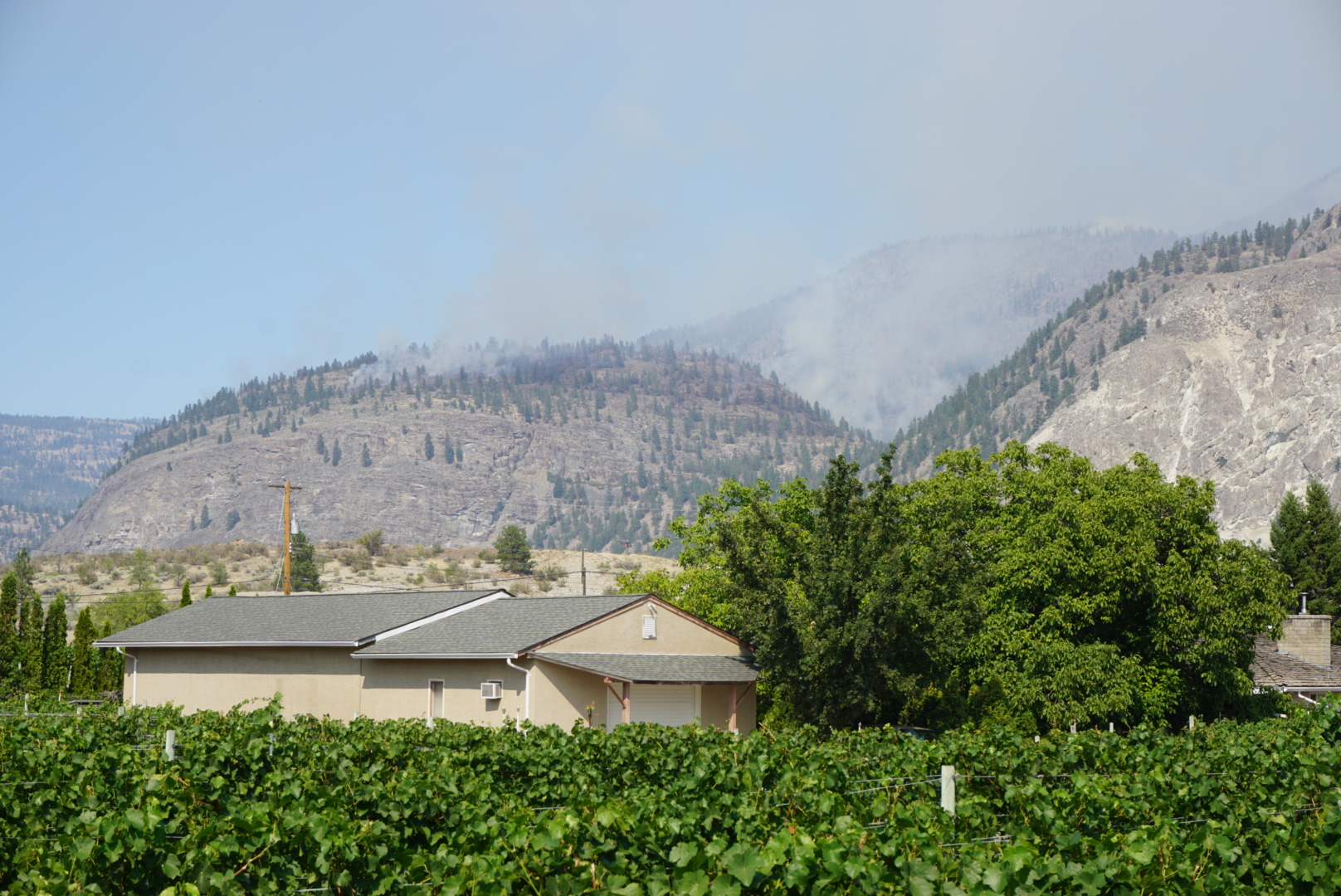Wildfires and wine country—what should I know before my wine travel vacation?
Over the past 2 decades as B.C.’s wine tourism sector has grown by leaps and bounds, there have been times when wildfires originating in British Columbia, Washington state and as far away as Oregon and California have affected the air quality of many parts of the province. While the vast majority of years have seen little or no impacts, those who traveled to their favourite wineries in the B.C. Interior in 2017 and 2018 will recall the haze hanging in the air. No one wants a wildfire to interrupt their B.C. wine travels, but is it something travellers should prepare for just in case?
As you’ll read below, a safe and enjoyable wine country experience can happen even regardless of wildfires happening around the province.
Painted Rock and the Christie Mountain wildfire

In the years since the devastating 2003 Okanagan Mountain wildfire, a handful of other wineries have had their own harrowing wildfire experiences. These operators are usually quick, however, to move on and return to the business of making and selling their wine. As is the case for John Skinner, founder and owner of Painted Rock Estate Winery, who had his own close call with a wildfire in 2020, and a serendipitous event that would result from it.
It was the Christie Mountain wildfire just outside of Penticton in the South Okanagan that threatened the winery that he had built from the ground up over twenty years. Skinner recalls seeing the puff of smoke rising up about 5 kilometres south along the Skaha Bench, which just 2 1/2 hours later would burn its way right to the mountainside above his vineyards. By that time all the patrons and staff – except John himself – had safely departed.
In those early terrifying hours, John feared the worse. It would be six days before the Christie Mountain wildfire was considered extinguished. Huge credit goes to the first responders and the “Con Air” flight personnel who bombed the upper hillside with water and fire retardant drops. During a news media interview, John credited the firefighters and promised that they would get some of his wine as a reward.
Soon after, one of the crew visited John and thanked him for the public acknowledgment. John sent the crew member away with his van brimming with cases of Painted Rock wine as a token of his appreciation. While a few bottles did get into the hands of the first responders, the bulk of the wine was sold at an auction with the proceeds going to the Penticton Food Bank. For Skinner, it could not have been a happier ending to a stress-filled experience.
Things to consider about wildfires in wine country
It is important for visitors to know that wineries have the safety of their customers top-of-mind. It is highly improbable that you’ll ever have a close encounter with a wildfire when visiting a winery. While there have only been a few occasions when vineyards have been put at risk from wildfires, heavy media coverage can be pretty devastating for wineries and tourism in general thanks to a resulting cancellation of visits. Any downturn in visitors can have a significant economic impact.
When they happen, most wildfires burn in the backcountry or on hilltops — usually as a result of a lightning strike. There are other times when fires are human caused, which is why all of us — smokers especially — have to be careful handling any incendiary materials such as a smouldering cigarette butt.
When wildfires happen, your experience will depend upon factors such as wind currents. Sometimes wildfire smoke may descend into the area you are staying or at one of your destinations. But aside from less than pristine blue skies, the haze is a hindrance instead of a threat. Often the skies will clear out by the following day or soon after, leaving you to enjoy the rest of your visit ‘haze-free.’
There are more extreme circumstances, of course. Think back to the devastating conditions in California and Oregon wine country last fall, with some of the worst air quality index readings in memory. It is hard to retrieve good holiday memories if the air is thick with smoke as it was down there last year.
It is unclear if any travellers have begun to adjust their vacation calendars to earlier in the season to avoid wildfire season. In the end it is hard to predict what will happen each year when it comes to wildfires, other than thanks to climate change the probability seems to have increased. During some years wildfire smoke may only result in dramatic sunsets, while in others you will see no signs at all. When the air quality is poor, however, it is wise to have a travel contingency plan.
How can I know if my wine travel experience will be affected?
Media reports while important for public safety can sometimes be confusing for those who are about to travel in BC wine country. If you are concerned, then take a moment to call either the accommodation or the winery in advance of your arrival. They will be able to tell you about the conditions, and answer any questions you might have.
There are few experiences that bring so much enjoyment as tasting wine right where it was grown and hearing the story of how it was produced — particularly in B.C. wine country. It is important to be aware, however, that the air quality can sometimes vary and that most often it will neither affect your personal safety nor your enjoyment at the wineries.
Remember to book ahead. The majority of wineries in B.C. have adopted an online booking system to allow you to have a more personalized and enjoyable tasting experience. Decide which winery you plan to visit and look up their websites for more information.

